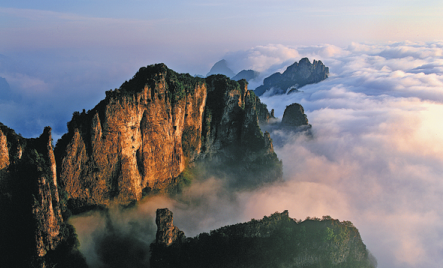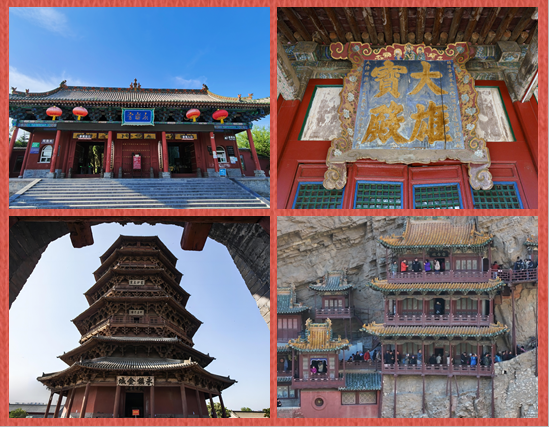Mountain range keeps close hold on local people's hearts

Wangmangling in Lingchuan county is one of the most spectacular parts of the Taihang Mountains. [Photo by Sun Ruisheng/China Daily]
Extending more than 400 kilometers from north to south, and serving as the border among Shanxi, Hebei and Henan provinces, the Taihang Mountains are one of the largest mountain ranges in North China.
Because of its high peaks, steep cliffs, unusual rocks, lush forests and clean waters, as well as its storied history over thousands of years, Taihang is one of the top three tourist attractions in Shanxi alongside the Yellow River and the Great Wall.
Wangmangling, in the south of the mountain range, is praised by many as the most beautiful and spectacular part of Taihang.
Located in the east of Lingchuan county in Shanxi, Wangmangling presents some of the most impressive sights in Taihang. These include a sea of clouds and sunrise viewed from the main peak; gorgeous valleys surrounded by the rising, red-colored cliffs; groups of waterfalls and highways running along the edge of cliffs.
The area's forest coverage surpasses 96 percent, with pine trees as the dominant plant. The whistling of the wind in the trees sounds like roaring waves.
With an average temperature of 22 C in the summer, Wangmangling offers an ideal retreat to escape hot cities.
On April 14, the Wangmangling scenic area welcomed more than 650 tourists from South China's Guangdong province.
They were told by the tour guide, Zhang Jiali, that Wangmangling's rising cliffs are representative of the famed "iron walls of Taihang".
Zhang said in the eyes of locals, the term "iron walls of Taihang" is not only a description of the landscape, but also a tribute to the heroes who protected the nation by fighting Japanese invaders seven decades ago.
During the War of Resistance Against Japanese Aggression (1931-45), the Taihang Mountains, including Wangmangling, were an important base for the Eighth Route Army led by the Communist Party of China.
When the nation and the people were at their most critical moment, the warriors of the army pledged to "build a new Great Wall with their very flesh and blood".
After the tour guide's introduction, Deng Jilin, a tourist from Guangzhou, the capital city of Guangdong, proposed singing a chorus to tune of On the Taihang Mountains, a song composed in the region and during the war.
"The song is even more touching when it is sung on this specific site where the national heroes devoted their energy and lives to protecting the nation and the people," Deng said.
With its main peak standing at an altitude of 1,665 meters, Wangmangling held a strategic position in North and Central China throughout history.
The flat mountain top was used as a military base in times of war and conflict. Relics of defense works, including four watchtowers, are still there.
In addition to the defense works, another engineering miracle in the region is a 6.5-km road running along the edge of the cliffs. It is said to have been built by local villagers by hand, using only simple tools. Construction of the project took about 30 years.
With a number of viewpoints along the road, it is now a favorite route for many self-driving tourists.
During the May Day holiday at the beginning of this month, Wangmangling received more than 11,000 visits, increasing 7.6 percent from the same period of last year.
Peng Ke'er contributed to this story.



